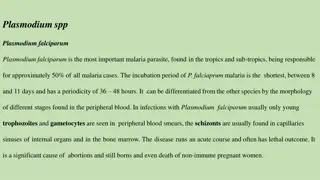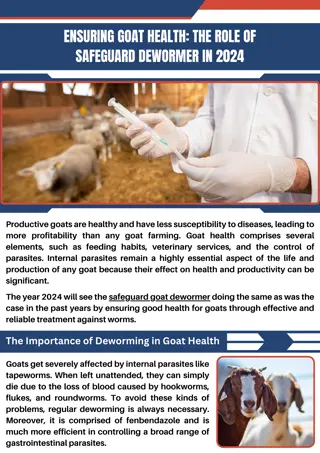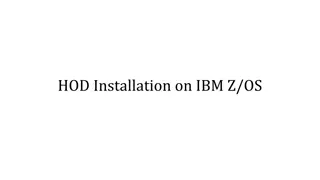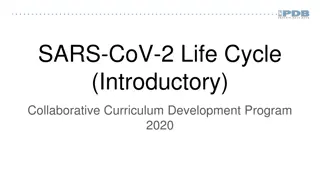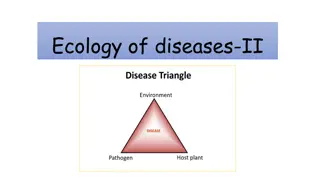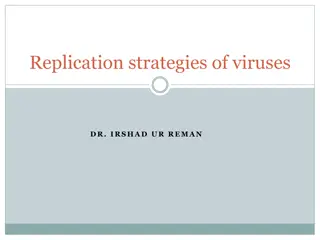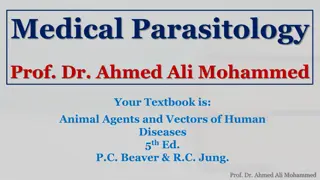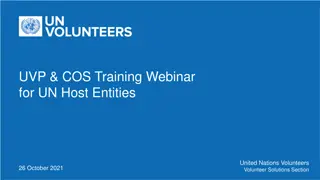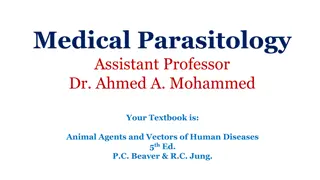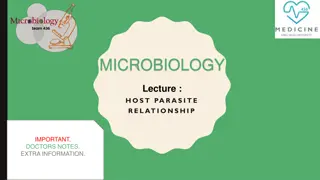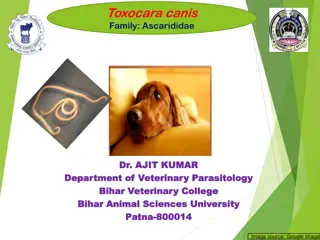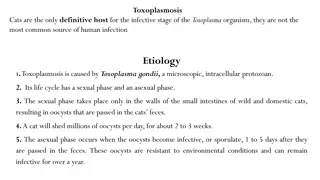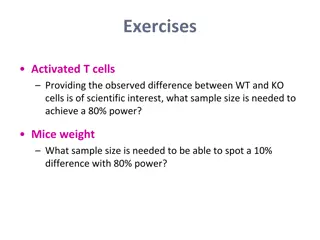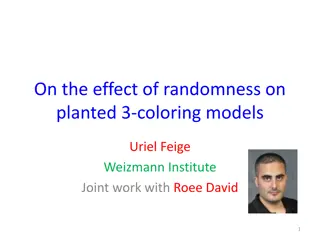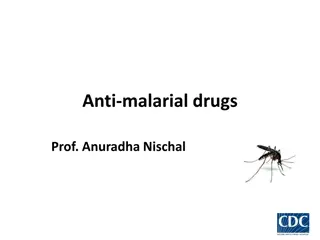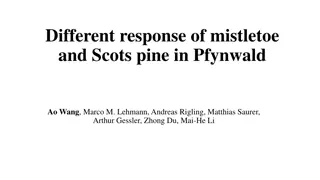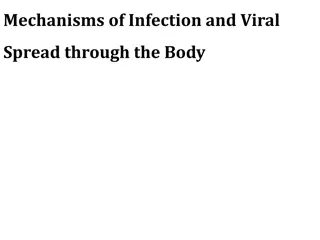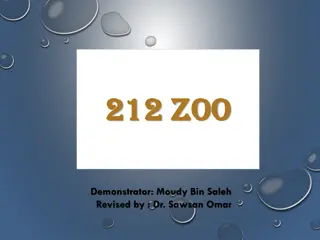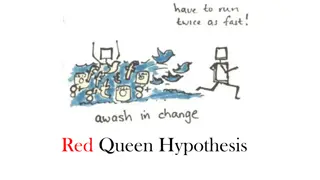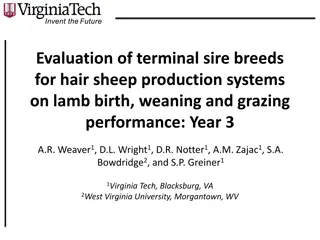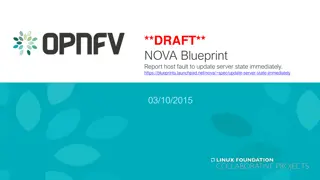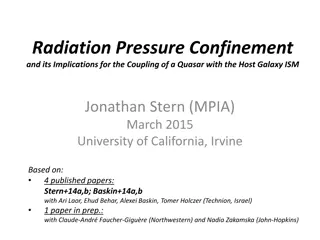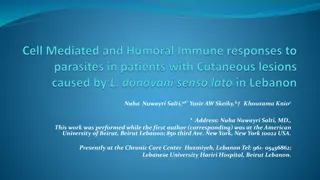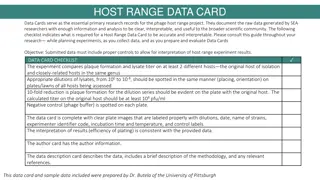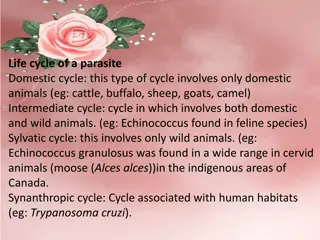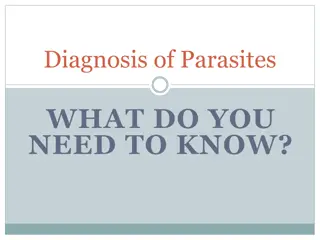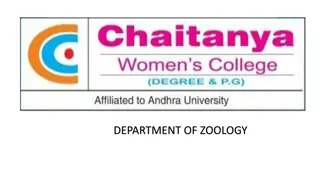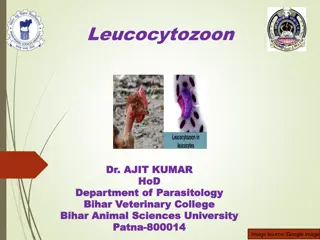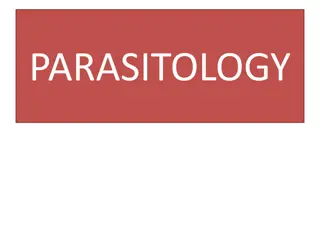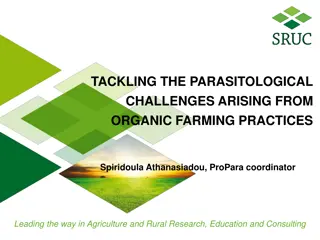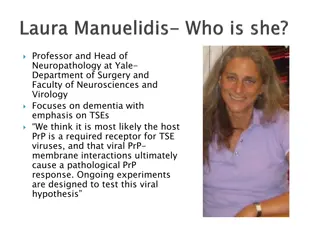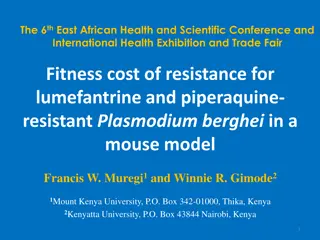Overview of Plasmodium falciparum and Plasmodium vivax Malaria Parasites
Plasmodium falciparum is the most significant malaria parasite, responsible for about 50% of cases, with a short incubation period and distinct morphology in blood smears. It causes severe symptoms and complications, affecting various organs. In contrast, Plasmodium vivax is the most common malaria
2 views • 7 slides
Control Internal Parasites In Animals
Parasite infections of goats can lead to improper digestion, reduced feed intake, weight loss, anemia and even death. Shop our safeguard goat dewormer to keep your goats healthy and parasite-free. Send us an email at sales@hubersanimalhealth.com for
0 views • 2 slides
Understanding Graft-Versus-Host Disease (GVHD) and Its Symptoms
Graft-versus-host disease (GVHD) is a potential complication following stem cell or bone marrow transplants, where donor cells attack the recipient's body. GVHD can occur in acute or chronic forms, presenting symptoms such as abdominal issues, skin rash, dryness, joint pain, and more. This autoimmun
0 views • 13 slides
Understanding Host Bibliographic Records in Alma/Primo VE
Explore the concept of Host Bibliographic Records in the Alma/Primo VE system, which address the issue of linking single items to multiple bibliographic records. Learn how host bibs work, their creation during data migration, implications for library services, and the various types of host bibs used
0 views • 24 slides
Step-by-Step Guide to Host On-Demand Installation on IBM Z/OS
Comprehensive instructions for installing Host On-Demand on IBM Z/OS platform, including prerequisites, configuring in administrative mode, using Installation Manager, setting up repositories, and launching IBM Installation Manager in console mode.
0 views • 26 slides
Understanding the SARS-CoV-2 Life Cycle: An Overview
SARS-CoV-2, the virus responsible for COVID-19, follows a complex life cycle involving viral attachment and entry, replication and synthesis, as well as viral assembly and release. The virus interacts with host cell proteins to enter, produce essential proteins and RNA for reproduction, and then ass
1 views • 5 slides
International Human Resources Management Approaches and Staffing Policies
International human resources management involves strategic staffing policies, such as ethnocentric, polycentric, geocentric, and regiocentric approaches. It focuses on selecting employees who align with the organization's culture and values. Hiring practices in global firms consider factors like ho
2 views • 27 slides
Understanding Ecosystems and Disease Ecology
Explore the diverse types of ecosystems, including autochthonous, anthropurgic, and synanthropic ecosystems, and their impact on disease ecology. Learn about biotopes, biocenosis, ecological mosaics, and ecological interfaces, and discover how infectious diseases can be transmitted across these inte
0 views • 10 slides
Viral Genome Replication Strategies and Mechanisms
Viruses utilize different replication strategies to ensure the replication of viral genomes, packaging into virions, and potentially altering the host cell's structure or function. These strategies are vital for the virus to operate effectively within the host cell's constraints. The replication pro
0 views • 15 slides
Guess the Phrase: A Fun Lip-Reading Game Show
Players participate in a lip-reading game show where they have to guess words or phrases mouthed by a host. Each correct guess earns points, with the player accumulating the most points declared as the winner. Quick guesses in the group chat are key to winning rounds. Host mutes and player unmutes e
0 views • 20 slides
Understanding Parasitism in Medical Parasitology by Prof. Dr. Ahmed Ali Mohammed
Prof. Dr. Ahmed Ali Mohammed delves into the intriguing world of parasitism, exploring the complex relationships between parasites and hosts. He explains the various types of relationships in parasitology, such as symbiosis, mutualism, commensalism, and parasitism, shedding light on how parasites in
0 views • 23 slides
Unified Volunteering Platform: Host Entity Account Management Training Update
Explore the recent updates in the Unified Volunteering Platform focusing on Host Entity account management training, webinars for UN Host Entities, and the launch of new self-service features. Learn about the roles within Host Entity accounts and the transition to the new system. Contact support for
0 views • 7 slides
Understanding Parasitic Relationships in Medical Parasitology
Medical Parasitology delves into the intricate relationships between parasites and their hosts, encompassing symbiosis, mutualism, commensalism, and parasitism. The success of a parasite hinges on achieving a delicate balance with its host, avoiding expulsion or harm. Various types of parasites are
0 views • 12 slides
Understanding Host-Parasite Relationship in Microbiology
In microbiology, the host-parasite relationship is crucial for understanding diseases caused by pathogens. This lecture covers definitions of terms like pathogenicity, pathogen, disease, resistance, susceptibility, infection, virulence, and transmissibility. It also delves into the division of host
0 views • 16 slides
Comprehensive Overview of Toxocara canis Life Cycle and Characteristics
Toxocara canis, also known as the Arrow-headed worm, is a parasite commonly found in dogs, particularly in puppies less than six months old. This article explores the general characteristics, life cycle, transmission routes, and prenatal infections of Toxocara canis. From the appearance of the male
0 views • 12 slides
Understanding Toxoplasmosis: Causes, Transmission, and Hosts
Toxoplasmosis is caused by the Toxoplasma gondii parasite, with cats being the definitive host. The parasite's life cycle involves both sexual and asexual phases, leading to potential infection in humans and other animals. Transmission can occur through contact with cat feces, ingestion of contamina
0 views • 10 slides
Understanding Host Stars and Their Importance in Exoplanet Research
Host stars play a crucial role in determining the physical parameters of planets they host, impacting exoplanet characterization and planet formation understanding. Data from astrometry, photometry, and spectroscopy, combined with stellar evolutionary models, help derive host star properties critica
0 views • 51 slides
Data Analysis and Experimental Results on Cell Activation, Animal Behavior, and Parasite Infection
The analysis covers research findings on cell activation in T cells, mice weight differences, arachnophobia reactions, cane toad parasite infection rates in different areas of Queensland, and neutrophil responses between KO and WT groups. It includes sample size calculations for statistical power in
0 views • 7 slides
Exploring the Impact of Randomness on Planted 3-Coloring Models
In this study by Uriel Feige and Roee David from the Weizmann Institute, the effect of randomness on planted 3-coloring models is investigated. The research delves into the NP-hard nature of 3-coloring problems, introducing a hosted coloring framework that involves choices like the host graph and th
0 views • 55 slides
Understanding Malaria: Causes, Symptoms, and Treatment
Malaria, caused by the Plasmodium parasite and transmitted through the bite of infected mosquitoes, is a major global health concern leading to millions of illnesses and deaths annually. The life cycle of the parasite involves different stages in the human host and the mosquito vector. Effective ant
1 views • 107 slides
Entamoeba histolytica: Protozoan Parasite in Digestive Tract
Entamoeba histolytica is a zoonotic protozoan parasite found in the digestive tracts of various hosts. It exists in trophozoite and cyst forms, with trophozoites containing erythrocytes and pseudopodia. The cyst stage is characterized by spherical masses discharged by trophozoites and containing chr
0 views • 17 slides
Contrasting Responses of Mistletoe and Scots Pine in Pfynwald Study
The research investigates the distinct responses of mistletoe and Scots pine in the Pfynwald forest. The study explores the dynamics of carbon and nutrient uptake by mistletoes from host trees under varying environmental conditions. Hypotheses include the impact of tree irrigation on photosynthesis
0 views • 14 slides
Understanding Mechanisms of Viral Infection and Spread
Viral infection involves a replicative cycle within the host, leading to a range of cellular responses from no apparent effect to disease. Factors such as virulence genes, host characteristics, and viral genome influence the pathogenicity and virulence of a virus. The process includes entry into the
0 views • 16 slides
Understanding Parasitology: A Comprehensive Overview
Parasitology is the study of parasites, their hosts, and the interactions between them. This field explores the different aspects of parasitism, including the relationships between parasites and hosts, the classification of major parasite groups like protozoa, helminths, and arthropods, and terms cr
0 views • 16 slides
Understanding the Red Queen Hypothesis and Coevolution in Host-Parasite Interactions
Exploring the Red Queen Hypothesis, which suggests that coevolution between hosts and parasites maintains genetic variation. Through images and descriptions, this content delves into the intricate dynamics of the evolutionary arms race, where constant adaptation is necessary for survival and the mai
0 views • 8 slides
Evaluation of Terminal Sire Breeds for Hair Sheep Production Systems: Year 3 Study
This study evaluates the efficacy of terminal sire breeds in hair sheep production systems to produce high-value market lambs focusing on survivability, growth, and parasite resistance. The research involves purebred Katahdin, Suffolk, and Texel sires, with a particular emphasis on grazing performan
0 views • 27 slides
Enhancing Server State Detection in OpenStack for Immediate Host Fault Reporting
This blueprint proposes the development of a new API in Nova to promptly update the server state in OpenStack when a host fault occurs. The intention is to ensure reliability and real-time updates of server and host states for Telco-grade VIM, allowing users to take necessary actions swiftly in case
0 views • 5 slides
Understanding Radiation Pressure Confinement in Quasars and Their Host Galaxies
Jonathan Stern's research explores the implications of radiation pressure confinement on the interaction between quasars and their host galaxies, focusing on photo-ionized gas systems. Through modeling and analyzing various properties of these systems, the study offers insights into quasar feedback
0 views • 35 slides
Immune Responses to Leishmania Infections in Eastern Mediterranean Region
Dermal lesions caused by Leishmania donovani complex are rare in the Eastern Mediterranean region. Viscerotropic parasites can cause severe infections, while cutaneous infections are mainly caused by Leishmaniatropica and major complexes. Host immune reactions to different strains of Leishmania have
0 views • 30 slides
Guidelines for Host Range Data Card Creation in Phage Research
Essential checklist for creating accurate and interpretable Host Range Data Cards in phage host range projects, detailing required experiment components, controls, data documentation, and analysis. The provided checklist ensures the inclusion of necessary information and proper formatting for clear
0 views • 6 slides
Understanding the Complexities of Parasite Life Cycles and Host Interactions
Parasites exhibit diverse life cycles and behaviors, with cycles ranging from domestic to sylvatic environments. Factors influencing parasite diseases include host specificity, immunity, and host-parasite interactions. Parasitism can alter host behavior, impacting ecological dynamics. Immunology pla
0 views • 9 slides
Understanding Parasite Diagnosis: What You Need to Know
Explore the essential information for diagnosing parasites, including their appearance, size, morphology, and where they are typically found. Learn how to identify parasites based on their characteristics, such as size, shape, and the host species they infect. Discover key factors involved in diagno
0 views • 12 slides
Life Cycle of Ascaris lumbricoides in Human Host
Ascaris lumbricoides, commonly known as roundworm, is a human parasite found in the intestine. The life cycle involves copulation, egg development, and infection of a new host through ingestion of eggs. It does not require an intermediate host. The larval stages undergo migration within the body. Th
0 views • 14 slides
Leucocytozoon: Haemoparasite in Birds from Bihar Animal Sciences University
Leucocytozoon, a haemoparasite found in birds, is studied at Bihar Animal Sciences University under Dr. Ajit Kumar. The parasite's morphology, life cycle, and host interactions are detailed, providing valuable insights into its impact on avian health. The research sheds light on the genus Leucocytoz
0 views • 13 slides
Understanding Parasitology: The Study of Organisms Living on or within Hosts
Parasitology is the study of parasites, which are organisms that live on or within a host and derive nutrients from them without benefiting the host. Parasites can be classified as ectoparasites or endoparasites based on their location in or on the host. Hosts play a crucial role in the life cycle o
0 views • 23 slides
Innovations in Parasite Control for Organic Farming
ProPara is dedicated to optimizing parasite control strategies for organic farms through targeted research and innovative tools. By generating data, evaluating implementation strategies, and collaborating with key stakeholders, ProPara aims to enhance animal health and welfare in organic farming pra
0 views • 19 slides
Psychological Flexibility and Relationship Quality Study
This study explores the relationship between psychological flexibility, individual wellbeing, and relationship quality. It reveals correlations between psychological flexibility, positive affect, negative affect, satisfaction with life, psychological wellbeing, and relationship quality in romantic r
0 views • 18 slides
Decoding the Role of Host PrP in Transmissible Spongiform Encephalopathies
Research led by the Professor and Head of Neuropathology at Yale focuses on the relationship between host PrP and TSE viruses, proposing that viral interactions with PrP trigger a pathological response. Contrary to popular belief, evidence suggests that PrP-res is a consequence of infection rather t
0 views • 28 slides
Impact of Resistance on Parasite Fitness in Quinoline-based Antimalarial Drugs
Resistance cost of fitness studies the impact of drug resistance on pathogens like Plasmodium berghei. Lumefantrine and Piperaquine, used in ACT against malaria, are investigated to understand how resistance affects parasite fitness. The research aims to provide insights into combating drug resistan
0 views • 15 slides
Understanding Giardia: Morphology, Life Cycle, and Pathogenesis
Giardia is a protozoan parasite that causes chronic diarrhea in various hosts, including humans and animals. This parasite has unique morphology with trophozoite and cyst stages. Its life cycle involves direct reproduction through binary fission and transmission through contaminated food or water. G
0 views • 19 slides
